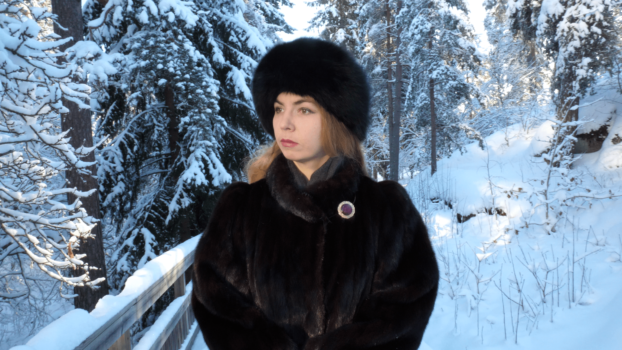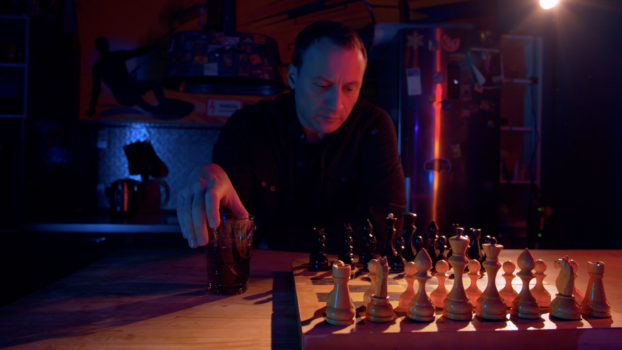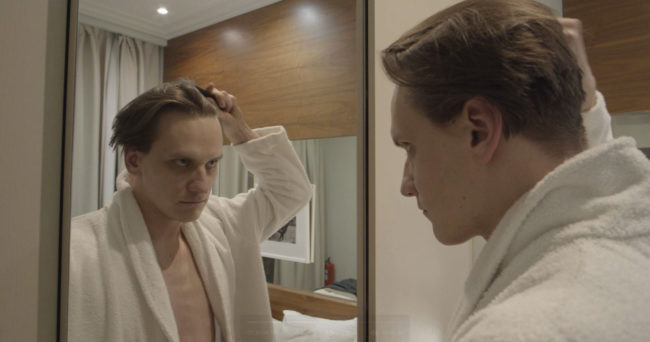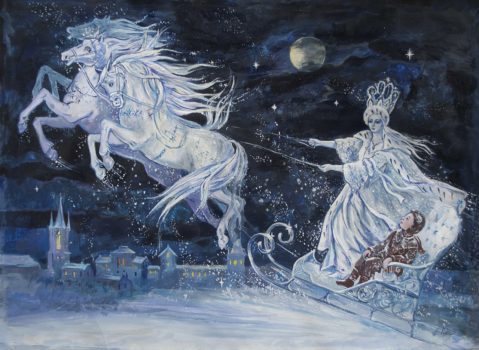
Today I take an interview with Diana Ringo, multi-talented independent director and producer of the new feature film “Quarantine”. “Quarantine” tells the story of a man who survives the apocalypse and lives in a bunker for 20 years. He is haunted by images from his past and reflects about whether he could have prevented the events which destroyed the whole world. The film stars Anatoly Bely and Aleksandr Obmanov.
2020 is the year that shook the world with by the means of lockdowns and quarantine. A sort of worldwide coup has occurred. But the situation has not been reflected in art. Your film “Quarantine” is a pleasant exception. How did you gather the courage to make this film? People who dare to speak the truth regarding the pandemic are now looked down upon.
I felt the need to tell an apocalyptic story, and what would be a better time than now? The issues around quarantines, lockdowns, vaccinations have become too politicised and you are forced to choose one side, everything is painted black and white. There is no nuanced thinking anymore. I am interested in problems beyond politics – of humanism, freedom, faith, conscience. There are bigger issues in life than viruses. We need to think about how to not only save lives, but also how to save our souls.

Anatoly Bely in “Quarantine”
Did you receive government funding for the film?
No, I did not apply for funding. As a first time director I did not see myself getting support. The film was independently produced, I was both producer and director. I had complete creative freedom.
You have an interesting surname, Ringo, which sounds like a stage name. In which countries did you live and how many languages you speak?
Many people are surprised when they find out that Ringo is my real surname. My great-grandfather was Josef Ringo a prolific inventor and writer from Vitebsk. My mother is Russian and my father is Finnish. I am a Finnish citizen. I was born in Russia; however, I have never lived there. I grew up in Finland and in my teenage years moved to Austria. I speak Russian, English, German and Finnish.
Have you always wanted to become a film director?
I have always enjoyed watching movies, they were my window to fantastic worlds. But I did not know I would choose film as a profession until I became older. I studied music since I was a small child, and I wanted to become a professional musician. However, I later decided that I wanted to do many different things, not only music. I enjoy filmmaking because it combines multiple art forms.
Why did you decide to take on so many functions in your film (director, producer, writer, editor, composer, actor)?
Ultimately I felt the need to control everything during the making of the film. I like the whole process of filmmaking. I switch roles when working so that I do not get bored. I enjoy doing different kinds of work.
Your film stars only 3 actors. How did you decide to cast Anatoly Bely in the lead role? What about Aleksandr Obmanov? Was it difficult to find the actors for your film?
Anatoly Bely was recommended to me by a friend who worked with him on another project. When I saw Anatoly in film and on television I knew immediately that I found the right actor for the role of Felix. Also, I found his poetry readings impressive. On stage, I really enjoyed his performance in “Master and Margarita” at the Moscow Art Theater. As for the role of Kirill, we held auditions. Many different actors tried for the part. Among the candidates I found that Aleksandr Obmanov delivered the best audition. I consider Aleksandr a very promising young actor.

Aleksandr Obmanov in “Quarantine”
What is the exact genre of the film? What is the main idea of the film? Did you have any specific message in mind when making “Quarantine”?
My film is a dystopian drama. I wanted to make the viewer imagine what the lack of resistance towards evil can lead to, from outside and inside oneself. To overcome evil, one must first overcome it from the within.
How would you describe Felix, the main character of the film? Is he a good person?
Felix is a complicated person, whom it is a difficulty to categorize. Memories have a strong hold on Felix and he struggles with his guilty conscience. Felix looks back into his past and tries to understand what was his role in the course of events which changed the whole world. He wonders if he could have done something to prevent the apocalypse or if the whole matter was always out of his hands.
Are the two male characters similar or not to each other in the film?
They are close friends and share more similarities than it first seems on the surface.
Can you tell us about your directing style and the film editing process?
I prefer not to use too many takes as I believe that actors often give their best work in their first takes. In my film Anatoly and Aleksandr gave fantastic performances and I am very happy with the result.
I edit my own films and it takes a lot of time and effort. But I find it completely worth it as it is my favorite part of filmmaking. It is great to be the first one who sees the story come alive. It has also helped me evolve as a composer. When I edit my film I see if music is not quite right, and then I continue working on the music until it fits perfectly.
Tell us about the music in the film. Who was involved in the process?
Only me. I composed the whole score myself using my digital piano and Logic Pro X with various VST plugins by Native Instruments. I performed and edited the music myself. The film features 26 original compositions. It was very important for me to make each piece unique and different. Music plays a very important role in my film, it sets the atmosphere and mood. The whole soundtrack is available on my YouTube channel.

Poster of “Quarantine”
Was it important for you to compose the film score?
Yes, it was very important, before making the film I decided that I must compose the whole soundtrack for my film. I love music and am very critical about it. I simply cannot imagine any other musician doing the score. In the future I also plan to compose scores for my own films.
Can you tell us about your musical background? What genre is your music?
I have played classical piano since I was a small child and have always loved great film scores. My favorite film composers are Ennio Morricone, Michel Legrand, Giorgio Moroder, Lalo Schifrin. It was always a huge dream for me to compose music for films. It is difficult to pinpoint the exact genre of my music, but I like to consider it as neo-classical.
What do you think about today’s film soundtracks?
I believe that music is greatly undervalued in modern films. I don’t think that film directors and producers truly understand the importance of music in film nowadays. The age of great film music is long gone. I struggle to remember any impressive film soundtracks made in the past decades, which is a pity.
How did you write the screenplay? Who are your favorite writers? What inspired you?
I wrote the script during the quarantine in Vienna. At that moment the regime worldwide started to move towards totalitarianism. Inspiration came when I imagined what unconditional obedience to the authorities could lead to, and this served as the as the starting point. And since that time things did not get better, and I feel that my film will only continue to become more current. We are truly living in an Orwellian nightmare. I began writing quite recently, as I used to concentrate more on music. I also enjoy writing poetry. I love Russian literature, Dostoevsky, Tolstoy, Pushkin, Blok.
Do you think that the events depicted in the film could happen in the future? Is the apocalypse about to happen soon?
Yes, I think the events in the film could easily happen in real life.
The painting of “The Snow Queen” by Elena Ringo, based on the fairy tale by Hans Christian Anderson, is featured in the beginning of the film. Please describe what it means in the context of the film.
“The Snow Queen” begins with evil forces trying to confront God with a cursed mirror. But instead the mirror gets broken and pieces of the shattered glass get stuck in peoples eyes. Their perception of reality gets twisted and distorted. Everything beautiful becomes ugly and everything intelligent starts to seem stupid to everybody. I believe that the tale is a good allegory for what happens in todays world.
Where was the film shot? How long was the shooting process?
The film was shot in Moscow (Russia), Turku (Finland), Vienna, (Austria). In Moscow the shooting with the actors took about two weeks. In Finland it took longer to shoot, because I was interested in capturing different seasons and nature.

Painting of “The Snow Queen” by Elena Ringo
What are your plans for the future?
I want to make my next film in Russia, and later wish to make an English language feature.
Are you fully satisfied with the end result? Would you cast the actors in some other project?
Yes, I’m completely happy with the finished film. If I would have an opportunity, I would definitely cast the actors in another film, yes.
As founder and director of the Prague Independent Film Festival, did your experience help with making your own film?
Yes, it did help a lot. I have watched many films for my festival which has broadened my horizons. Also I got to know many different film directors and producers which made me understand film industry much better.
Does your family support you as a filmmaker? Can you tell something about your family?
Yes, my family is very supportive. My mother, Elena, is an artist, a very talented painter. Her painting “The Snow Queen” is featured in my film. My grandmother is a mathematician and a poet.
What are your favorite films and who are the filmmakers which inspire you most? What are your favorite decades in film?
There are far too many films to list which I like. A top 10 list which comes to mind to me now – The Good, the Bad and the Ugly, Once Upon a Time in the West, Breathless, Pierrot Le Fou, La Dolce Vita, 8 1/2, Throne of Blood, Ran, The Clockwork Orange, Videodrome. Some of my favorite film directors are Jean-Luc Godard, Sergio Leone, Federico Fellini, Ingmar Bergman, Akira Kurosawa, Stanley Kubrick, David Lean, Ken Russel, David Lynch, David Cronenberg. I mostly enjoy watching films made in the 1960s. Also I like a lot to listen to film soundtracks from that period.
Do you consider yourself as a feminist filmmaker?
Yes, I consider myself a feminist. I believe gender equality in work and personal life is very important and I wish there to be more women directors and producers. Women’s voices are important and need to be heard. I am honored to be friends with some extremely talented female directors.
What advice do you have for filmmakers In general?
I’ve realized that creating your own opportunities is the best way to succeed in this competitive field, especially as a woman. Everyone always wants to get hired for something, but the key to success is to create interesting projects yourself. Before making films I believe it is important to try several creative professions in order to understand your strengths and weaknesses. And also to never give up, and follow your dreams.